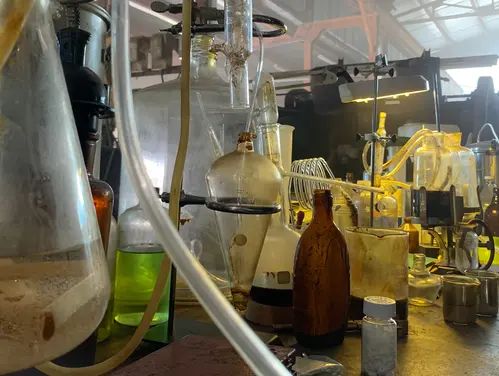The Iowa Department of Public Safety has specially trained law enforcement officers from the Division of Narcotics Enforcement, Iowa State Patrol, State Fire Marshal, and chemists from the Division of Criminal Investigation. These officers provide assistance to city and county law enforcement throughout the state of Iowa. All of our officers are certified in the investigation, dismantling, and removal of clandestine laboratories.
Chemicals used in the illicit manufacture of narcotics present both environmental and explosive hazards to property and the people of Iowa. The clandestine lab team provides safe and environmentally sound disposal of these chemicals.
Since 2020, state, local and county departments seized a total of 26 combined clandestine labs.
How to Recognize a Meth Lab
Meth labs may be set up at campgrounds, rest areas, rental homes, motel rooms, abandoned cars, garages, storage sheds, barns, and vacant buildings.
A typical meth lab is a collection of chemical bottles, hoses, and pressurized cylinders. The cylinders can take many forms, from modified propane tanks to fire extinguishers, scuba tanks, and soda dispensers. The tanks contain anhydrous ammonia or hydrochloric acid—both highly poisonous and corrosive.
Labs are frequently abandoned and the potentially explosive and very toxic chemicals are left behind. Chemicals may also be burned or dumped in woods or along roads.
If You Suspect a Meth Lab
Do not enter a site that you think may be used for cooking meth. Labs present extreme dangers from explosions to exposure to hazardous chemicals. Breathing the fumes and handling substances can cause injury and even death.
Drug labs are considered hazardous waste sites and should only be entered by trained and equipped professionals.
Never handle materials you suspect were used for making meth, such as contaminated glassware and needles. Skin contact can result in burns or poisoning. Handling items can also cause some of the chemicals to explode on contact with water or air.
Consider that when professionals respond to a drug lab, they do not enter the building until they have put on chemically resistant suits and boots, special gloves, and respirators.
If you suspect a meth lab in your area, contact your local law enforcement agency immediately.
Cleaning Up Former Meth Labs
The Iowa Department of Health and Human Services' Division of Environmental Health has resources to assist you in determining if your property was a site for an illegal meth lab, concerns associated with these hazards, health effects, and general guidelines in removing contaminates. This document is in an Adobe PDF file. Click on the link to download the file.
215 E 7th St
Des Moines, IA 50319
